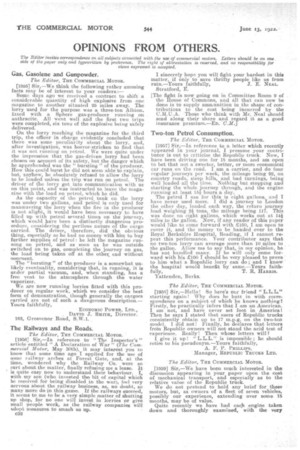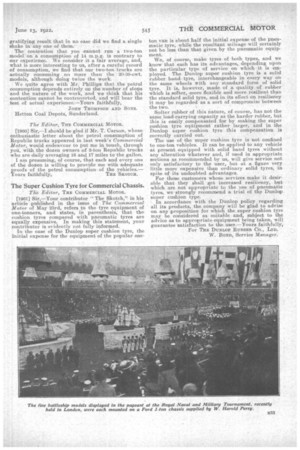OPINIONS FROM OTHERS.
Page 30

Page 31

If you've noticed an error in this article please click here to report it so we can fix it.
g'he side Editor invites correspondence on all subjects connected with the use of commercial motors. Letters should be on one . of the paper only and typewritten, by preference. The rig.itt of abbreviation is reserved, and no responsibility for views expressed is accepted.
Gas, Gasolene and Gunpowder.
The Editor, THE COMMERCIAL MOTOR.
[1955} Sir,—We think the following rather amusing facts may be of interest to your readers:— Some days ago we received a contract to shift a considerable quantity of high explosive from one magazine to another situated 25 miles away. The lorry used for the purpose was a three-ton Albion, fitted with a Sphere gas-producer running on anthracite. All went well and the first two trips were completed, six tons of the explosive being safely delivered.
On the lorry reaching the magazine for the third trip, the officer in -charge evidently concluded that there was some peculiarity about the lorry, and, after investigation, was horror-stricken to find that it was not running on petrol. We were quite under the impression that the gas-driven lorry had been chosen on account of its safety, but the danger which he apprehended was the " bursting" of the producer. How this could burst he did not seem able to explain, but, anyhow, he absolutely refused to allow the lorry to be loaded unless the trip was run on petrol. The driver of the lorry got into communication with us on this point, and was instructed to leave the magazine with the load on petrol, which he did.
As the capacity of the petrol. tank on the lorry was under two gallons, and petrol is only Used for manceuvring the lorry when the fire in the producer is not alight, it would have been necessary to have filled up with petrol several times on the journey, which would have been a distinctly dangerous procedure, considering the perilous nature of the cargo carried. The driver,. therefore, did the obvious thing, especially as he had no money with him to buy further supplies of petrol : he left the magazine running on petrol, and as soon as he was outside switched on to gas, completing the journey on gas, the load being taken off at the other_ end without comment.
The " bursting " of the producer is a somewhat unlikely eventuality, considering that, in running, it is under partial vacuum., and, when standing, has a free vent to the atmosphere through the water vaporizer.
We are now running lorries fitted with this producer on regular work, which we consider the best form of demonstration, though generally the cargoes carried are not of such a dangerous description.— Yours faithfully,
ECONOMIC POWER, LTD., DAVID J. &arm, Director. 162, Grosvenor Road, S.W.1.
The Railways and the Roads.
The Editor, THE COMMERCIAL MOTOR.
[1956; Sir,—In reference to " The Inspector's " article entitled " A Declaration of War " (rite Commercial Motor, May 3.0th), it may interest you to know that some time ago I applied for the use of some railway arches at Forest Gate, and, at the time, wondered why the Railway Co. were so curt about the matter, finally refusing me a lease. it is quite easy now to understand their behaviour. I, with my son (who invested the bit of capital which he received for being disabled in the war), foel very nervous about the railway business, as, no doubt, so many more do in this game. If the railways succeed, it seems to me to be a very simple matter of shutting up shop, for no one will invest in lorries or give small people work, as the railway companies will adopt measures to smash us up.
c32 I sincerely hope you will fight your hardest in this matter, if only to save thrifty people like us from ruin.—Yours faithfully, J. E. NEAL. Stratford, E.
[The fight is now going on in Committee Room 9 of the House of Commons, and all that can now be done is to supply ammunition in the shape of contributions to the cost being incurred by the C.M.U...k. Those who think with Mr. Neal should send along their share and regard it as a good insurance premium.—ED..C.M.]
Two-ton Petrol Consumption.
The Editor, THE COMMERCIAL MOTOR.
[19571 Sir,—In reference to a letter which recently appeared in your journal, I presume your contributor is out to criticise the Republic truck. Now, I have been driving one for 18 months, and am open to het that not a sweeter, better, or more economical car runs on the road. I am a carrier, and do four regular journeys per week, the mileage being 92, on country roads, steep hills, and bad turnings, being well loaded all the time. Nothing but stopping and starting the whole journey through, and the engine running at least 154 hours a'day.
The petrol I use for this is eight gallons, and I have never used more. 1 did a journey to London the other day, loaded each way, the return journey load weighing 2i tons, the mileage being 117. This was done on eight gallons, which works out at 14i miles to the gallon. Now, if any reader of this paper would like to come forward with 2100, I am open to cover it, and the money to be handed over to the Royal Berkshire Hospital, Reading, if I cannot repeat this performance. Your contributor says that no two-ton lorry can average more than 10 miles to . the gallon. Allow me to say that, in my opinion, he has not handled many. If he will only come forward with his £100 I should be very pleased to prove to him what a Republic lorry can do; and I know the hospital would benefit by same.—Yours faith fully, T. R. HARRIS. Yattenden, Berks.
The Editor, THE COMMERCIAL MOTOR.
[1958] Sir,—Hello! So here's our friend "L.L.L." starting again! Why does he butt in with correspondence on a subject of which he knows nothing? Firstly, he practically infers that I am an American. I am not, and have never set foot in America Then he says I stated that users of Republic trucks consistently obtain up to 17 m.p.g. on the two-ton model. I did not Finally, he declares that letters from Republic owners will not stand the acid test of experience. Really! Then whose letters will?
I give it up! " L.L.L." is impossible ; he should retire to his pseudonym.—Yours faithfully, A. F. P. PHILLIPS,
Manager, REPUBLIC TRUCKS Lm.
The Editor, TITE COMMERCIAL MOTOR.
[1959] Sir,—We have been much interested in the discussion appearing in your paper upon the cost of mechanical transport, and especially as to the relative value of the Republic truck
We do not pretend to hold any brief for these motors, but, as owners of a fleet of seven vehicles, possibly our experience, extending over some 15 months, may be of value. Quite recently we have had each engine taken down and thoroughly examined, with the very gratifying result that in no case did we find a single shake m any one of them..
The contention that you cannot run a two-ton model on a consumption of 14 m.p.g. is contrary to our experience. We consider it a fair average, and what is more interesting to us, after a careful record of consumption, we find that our two-ton trucks are actually consuming no more than the 20-30-cwt. models, although doing twice the work.
We quite agree with Mr. Phillips that the petrol consumption depends entirely on the number of stops and the nature of the work, and we think that his contention cannot be controverted, and will bear the test of actual experience.—Yours faithfully, JOHN THOMPSON AND SONS. Hetton Coal Depots, Sunderland.
The Editor, THE COMMERCIAL MOTOR.
[1960] should be glad if Mr. T. Carson, whose enthusiastic letter about the petrol consumption of Republic trucks appeared in last week's Commercial Motor, would endeavour to put me in touch, through you, with the dozen owners of 2-ton Republic trucks who are daily averaging 16 and 17 miles to the gallon.
I am presuming, of course, that each and every one of the dozen is willing to provide me with adequate proofs of the petrol consumption of the vehicles.— Yours faithfully, THE SKOTCH.
The Super Cushion Tyre for Commercial Chassis.
Tlie Editor, THE COMMERCIAL MOTOR.
[1961] Sir —Your contributor "The Skotch," in his article published in the issue of The Commercial Motor of May 23rd, refers to the tyre equipment of one-tonners, and states, in parenthesis, that the cushion tyres compared with pneumatic tyres are equally expensive. In making this statement, your contributor is evidently )lot fully informed. In the case of the Dunlop super cushion tyre, the initial expense for the equipment of the popular one
ton van is about half the initial expense of the pneumatic tyre, while the resultant mileage will certainly not be less than that given by the pneumatic equipment.
We, of course, make tyres of -both. types, and we know that each has its advantages, depending upon the particular type of service on which it is employed. The Dunlop super cushion tyre is a solid rubber band tyre, interchangeable in every way on the same wheels With any standard form of solid tyre. It is, however' made of a quality of rubber which is softer, more flexible and more resilient than the standard solid tyre, and in its effect on resiliency it may be regarded as a sort of compromise between the two.
Softer rubber of this nature, of course, has not the same load-carrying capacity as the harder rubber, but this is easily compensated for by making the super cushion tyre equipment rather larger, and in the Dunlop super cushion tyre this compensation is correctly carried out.
The use of the super cushion tyre is not confined to one-ton vehicles. It can be applied to any vehicle at present equipped with solid band tyres without any alteration whatever and, if used in appropriate sections as recommended by us, will give service not only satisfactory to the user, but at a figure very little more expensive than ordinary solid tyres, in spite of its undoubted advantages.
For those customers whose services make it desir-able that they shalt get increased resiliency, but which are not appropriate to the use of pneumatic tyros, we strongly recommend a trial of the Dunlop super cushion type.
In accordance with the Dunlop policy regarding all its products, the company will be glad to advise on any proposition for which the super cushion tyre may be considered as suitable and, subject to the advice as to appropriate equipment being taken, will guarantee satisfaction to the user.—Yours faithfully, For THE DUNLOP RUBBER CO., LTD. W. BOND, Service Manager.


































